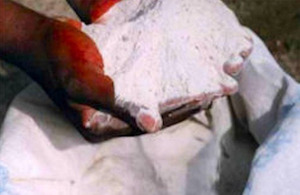DFID Research: FarmLime - sourcing low cost lime for small-scale farming
FarmLime improves access of small farmers to agricultural lime.

Hammer mill-derived agricultural lime (aglime) from the FarmLime research trials
Agricultural lime is a farming input taken for granted in developed countries; however this does not hold true in less-developed regions such as sub-Saharan Africa. The DFID-sponsored FarmLime project aimed to improve the access of small-scale farmers in less-developed countries to agricultural lime (aglime); detailed research carried out in Zambia led to the development of trials of aglime production and the spontaneous uptake of research.
Soil fertility is crucial to food productivity and in turn to sustainable rural livelihoods. The application of fertilisers and many traditional cultivation practices such as ‘slash and burn’ have an acidifying effect upon soil, and high soil acidity reduces crop yields. Without the use of lime to neutralise the acidity, once-fertile farmland can become barren and this can lead to desertification. Current farming practice in many developing countries often ignores the need for lime. Furthermore, subsistence farmers cannot afford to use lime as it is produced centrally and is expensive to transport.
The agricultural production of small-scale farmers could be doubled by the use of aglime; this little used input has the potential to revitalise the small-scale agricultural sectors in many southern African countries. There are an estimated 800,000 small-scale farming households in Zambia alone, which accounted for the production of 925,000 tonnes of maize in 2005/06 (65% of national production).
Lime is produced where it is needed
The project demonstrated that low cost aglime could be produced on a small-scale using appropriate technology in southern African farming districts where it is most needed. A Zambian-built hammer mill was used to mill the carbonate rocks. The mill was normally used for maize milling and is a familiar piece of technology to farmers.
Agricultural researchers promoted the use of lime by directly working with and training small-scale farmers and through extension workers. In turn, extension officers learnt the benefits of using lime, how to apply lime and how it would help the small-scale farmers they work with; and farmers were taught how to apply lime and learned what difference it made to their crop yields. Small-scale farmers were willing to try out an unfamiliar agricultural input and were impressed with the results.
In Solwezi district in the northwest of Zambia there was spontaneous uptake of aglime production using the appropriate technology approach of the project. An existing privately owned artisanal scale mining operation diversified to meet the needs of local farmers and provided jobs for local mining workers.
The impact of this research could be dramatic in the long term. Widespread availability of low cost aglime could revitalise the small-scale agricultural sector and have profound impacts on the prosperity of rural communities in many parts of Africa. Use of aglime could transform Zambia, and other southern African countries into maize exporters, providing a significant source of foreign exchange. Although Zambia was the main test-bed for the research, workshops and other research activities have highlighted the potential for application in other African nations including Botswana, The Gambia, Ghana, Malawi, Uganda and Zimbabwe.